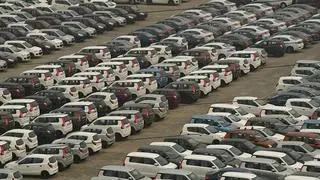Beleaguered carmakers in Delhi and the National Capital Region (NCR) breathed easy on Friday after the Supreme Court allowed them to register diesel-run cars with engine capacity of 2000 cc and above, provided they pay a ‘green charge’ of 1 per cent of the vehicle’s ex-showroom price.
Implementing the ‘polluter pays’ legal principle by lifting the ban it had imposed on high-end cars and SUVs to curb air pollution in the National Capital, a Special Bench, headed by Chief Justice TS Thakur, directed the carmakers or dealers to deposit the 1 per cent ‘Environment Compensation Charge’ with the Central Pollution Control Board (CPCB).
The Bench said it was open to the idea of extending the same ECC to smaller diesel cars, that is, those with less than 2000 cc engine capacity, and to hearing arguments on this aspect.
Middle-class families in the Capital may have to pick up the tab if the court decides to apply the same yardstick for registration of smaller diesel cars.
Carmakers mooted ECC levy The lifting of the ban on fresh registration of high-end cars provides relief for the luxury car industry. In fact, the suggestion to pay the 1 per cent ECC came from Mercedes.
The Bench’s decision to modify its December 16, 2015, ban on fresh registration of diesel cars with 2000-cc-and-above engine capacity came after manufacturers and dealers agreed to convey to buyers that the ECC payment would be a “condition precedent” for registration.
Proof of payment The Bench, also comprising Justices AK Sikri and R Banumathi, recorded the submission of amicus curiae and senior advocate Harish Salve that registration of these categories of cars should not be done until the ECC payment receipt is produced before the registration authority. “Registration shall be done only after the authority satisfies itself upon the deposit of the ECC amount,” Chief Justice Thakur observed in the order.
The CPCB (Central Pollution Control Board) has been directed to open a separate bank account for ECC deposits.
Question of authority The court modified its December 16 order despite the Centre’s objection that courts do not have the authority to levy such charges, and that such authority vests solely with the Executive.
The Bench left open the question whether the ECC rate should be higher than 1 per cent, but said that such an increase, if ever implemented, would not be done retrospectively.
“Let us first get used to 1 per cent ECC. We do not want the sword of a higher charge hanging over them at this moment,” Chief Justice Thakur said.








Comments
Comments have to be in English, and in full sentences. They cannot be abusive or personal. Please abide by our community guidelines for posting your comments.
We have migrated to a new commenting platform. If you are already a registered user of TheHindu Businessline and logged in, you may continue to engage with our articles. If you do not have an account please register and login to post comments. Users can access their older comments by logging into their accounts on Vuukle.